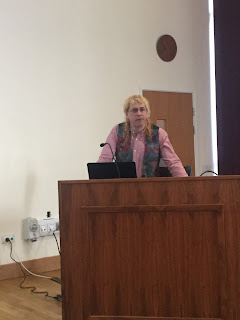This post is by Cristina Borgoni (pictured above), Assistant Professor in the Department of Philosophy at the University of Graz. Here she summarises her recent paper 'On Knowing One's Own Resistant Beliefs', published in Philosophical Explorations.
I have two lines of research in philosophy: one is on self-knowledge and the other is on beliefs. In self-knowledge, I am part of a research trend that tries to expand the philosophical agenda in order to incorporate human concerns on the topic. Everybody knows that knowing oneself (e.g., one’s values or one’s deep desires) can be very difficult. However, philosophy has not been concerned with such difficulties. Philosophy has rather traditionally focused on a different issue, namely, on explaining how we know some of our thoughts in an apparently immediate and almost infallible way (e.g., if someone asks whether you believe it is raining now, you will have no problems in knowing immediately what you believe). However, the aspects of our psychological life that are not known in such a special way are left out from the philosophical agenda, including our resistant beliefs.
A resistant belief is a recalcitrant cognition that persists in the person’s psychology despite the person’s epistemic reasons against the belief. I have examined the nature of this type of belief in a number of papers, which belong in my research on beliefs. An example of a resistant belief is the following. Imagine that you have learnt since very early that women are not fit for politics. Perhaps, you have grown up in a community with only a few, or even no, women politicians. Or, perhaps, you learnt it from your family and friends, who explicitly acknowledged that women were very good for a variety of tasks but not for politics; men were the ones to represent your society collective interests. Today, however, you know and actually defend the idea that men and women are equally fit for politics. Nevertheless, your early-inculcated prejudicial belief might still be part of your psychology, and might still guide some of your automatic thoughts and emotional reactions. In this imaginary situation, you have a resistant belief.
A resistant belief is a recalcitrant cognition that persists in the person’s psychology despite the person’s epistemic reasons against the belief. I have examined the nature of this type of belief in a number of papers, which belong in my research on beliefs. An example of a resistant belief is the following. Imagine that you have learnt since very early that women are not fit for politics. Perhaps, you have grown up in a community with only a few, or even no, women politicians. Or, perhaps, you learnt it from your family and friends, who explicitly acknowledged that women were very good for a variety of tasks but not for politics; men were the ones to represent your society collective interests. Today, however, you know and actually defend the idea that men and women are equally fit for politics. Nevertheless, your early-inculcated prejudicial belief might still be part of your psychology, and might still guide some of your automatic thoughts and emotional reactions. In this imaginary situation, you have a resistant belief.













